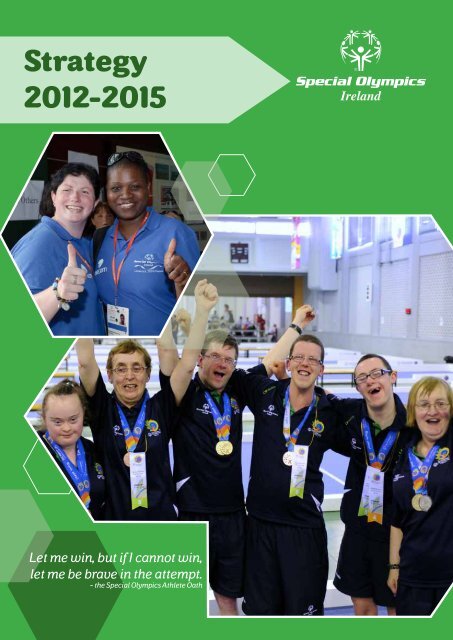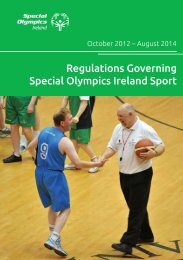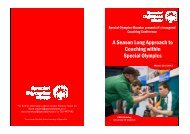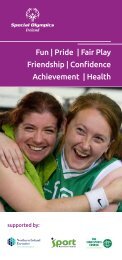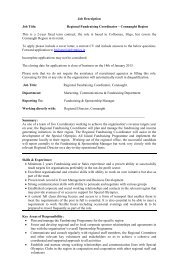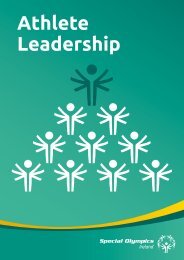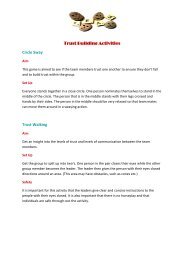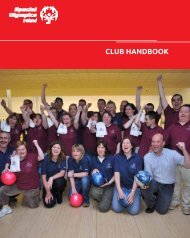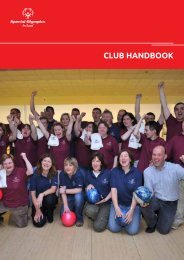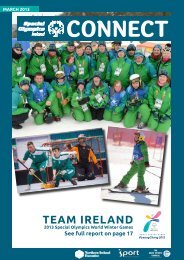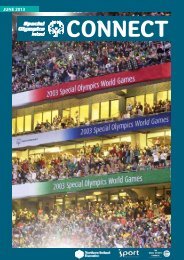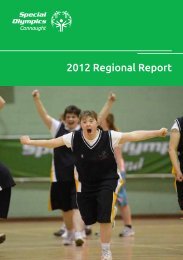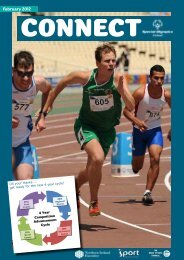Strategy 2012-2015 - Special Olympics Ireland
Strategy 2012-2015 - Special Olympics Ireland
Strategy 2012-2015 - Special Olympics Ireland
- No tags were found...
You also want an ePaper? Increase the reach of your titles
YUMPU automatically turns print PDFs into web optimized ePapers that Google loves.
<strong>Strategy</strong><strong>2012</strong>-<strong>2015</strong>Let me win, but if I cannot win,let me be brave in the attempt.~ the <strong>Special</strong> <strong>Olympics</strong> Athlete Oath
<strong>Special</strong> <strong>Olympics</strong> <strong>Ireland</strong> <strong>Strategy</strong> <strong>2012</strong>-<strong>2015</strong>ContentsMessage from CEOIntroductionReview of Progress 2008-2011Contents346<strong>Strategy</strong> <strong>2012</strong>-<strong>2015</strong>Long Term VisionKey ChallengesStrategic FrameworkStrategic GoalsStrategic ObjectivesPillar 1: Advance Quality SportPillar 2: Build CommunitiesPillar 3: Connect Fans and FundsPillar 4: Develop Movement LeadershipPillar 5: Establish Sustainable CapabilitiesResource Requirements99111213202
<strong>Special</strong> <strong>Olympics</strong> <strong>Ireland</strong> <strong>Strategy</strong> <strong>2012</strong>-<strong>2015</strong>Message fromthe CEOI am delighted to present the <strong>Special</strong> <strong>Olympics</strong><strong>Ireland</strong> Strategic Plan <strong>2012</strong> – <strong>2015</strong> which will guideus over the next four years. The plan is the endresult of a very wide-ranging consultation processover a six-month period, involving athletes, families,volunteers, staff, funders and other stakeholdersacross the island.I look back with pride and absolute joy at thetremendous progress the organisation has madeduring our last strategic phase. In particular,we have welcomed 3,139 new athletes to theprogramme and have established 79 new clubssince 2008 alone. We have successfully brought the<strong>Special</strong> <strong>Olympics</strong> Programme closer to our athletesand deeper into local communities and yet, we havemuch more still to do.<strong>Special</strong> <strong>Olympics</strong> <strong>Ireland</strong> has been a leader andbeacon of light for the global organisation. We willcontinue to lead the way. Our vision for the future is tobuild a sustainable programme, one that continues toprovide a high quality sports programme for athletesin their local community. Through our many differentstakeholders, including over 25,000 registeredvolunteers and our countless family members,key sponsors, council of patrons, skilled staff,government agencies, police forces north & south,other community leaders and, most importantly, over10,000 fantastic athletes, we are an unstoppableforce.Although we face challenges, a number of which wehave identified within this Strategic Plan, our provenrecipe of success is that, as a movement, we pulltogether. As we look forward to the new four-yearcycle, recognising the backdrop of gloomy economicprevailing conditions, <strong>Special</strong> <strong>Olympics</strong> will continueto be “a flame of hope” for Irish communities.Continually we advocate that the two key enablers toachieving our vision are people and finance. As weapproach our new strategic period, this remains astrue as ever. We will raise the bar. We will continueto changes lives. Our athletes and their familiesdeserve the very best. Our athletes are centralto every aspect of this strategy and they are ourconstant source of inspiration and pride.I look forward to embracing our new strategy withyour support.Matt EnglishCEO, <strong>Special</strong> <strong>Olympics</strong> <strong>Ireland</strong>3
<strong>Special</strong> <strong>Olympics</strong> <strong>Ireland</strong> <strong>Strategy</strong> <strong>2012</strong>-<strong>2015</strong>IntroductionAs part of the worldwide <strong>Special</strong> <strong>Olympics</strong> movement, <strong>Special</strong> <strong>Olympics</strong> <strong>Ireland</strong>’s primarypurpose is to work across the island of <strong>Ireland</strong> to further the organisation’s globalmission, which has remained unchanged since 1968:Provide year-round sports training and athletic competition in a variety of Olympic-type sports forchildren and adults with intellectual disabilities, giving them continuing opportunities to developphysical fitness, demonstrate courage, experience joy and participate in a sharing of gifts, skills &friendship with their families, other <strong>Special</strong> <strong>Olympics</strong> athletes, and the community.<strong>Special</strong> <strong>Olympics</strong> takes place every day. Theessence and spirit of <strong>Special</strong> <strong>Olympics</strong> sport is visibleand palpable at local level, where athletes train on aweekly basis in the 410 1 clubs 2 that are establishedin communities across the island. Thousands ofvolunteers help support and drive the vision of theorganisation which is to provide every person with anintellectual disability the opportunity to take part in aregular high quality sports programme within their localcommunity.Over 4,000 club volunteers,including coaches andmanagement team members,ensure athletes have a qualityparticipation and trainingexperience at local level, which,of course, includes preparationfor competition. Competitionopportunities for athletes rangefrom seasonal leagues, inter-clubevents to once-off tournamentsand one-day competitionevents organised at Area andRegional level as part of theregular programme of activities,as well as official advancementcompetitions. Event volunteers runand manage all competition events.In official advancement competition, an athlete needsto have participated at each prior level, i.e. Area andRegional level, and be selected to advance from eachlevel to the next, in order to progress to All-<strong>Ireland</strong>level. Traditionally, All-<strong>Ireland</strong> level competition isoffered in an olympics-type setting of a ResidentialGames. From All-<strong>Ireland</strong> level competition, athletesare selected to represent <strong>Ireland</strong> internationally at the<strong>Special</strong> <strong>Olympics</strong> World Summer Games, an event thatis held every four years. All-<strong>Ireland</strong> competition takesplace in the year prior to a World Games and thus alsotakes place once every four years. The next All-<strong>Ireland</strong>Games will take place in 2014, followed by WorldGames in <strong>2015</strong>.The sport programme in <strong>Special</strong> <strong>Olympics</strong> iscomplemented by a range of other initiatives andprogrammes that facilitate athlete development,the involvement of the families of athletes andthe recruitment, training andassignment of volunteers.Committed volunteers at everylevel deliver all of our activities,from the Board of Directors tothe local Club. The volunteersdedicate their time to improve thelives of people with intellectualdisabilities and advance theirintegration within Irish society.The organisation continuouslystrives to ensure that all ouractivities are run in compliancewith good governance andmanagement and in line with bestpractice guidelines, policies andprocedures. In this regard, theongoing development and trainingof our athletes, volunteers, staff and board is vital to ourcontinued success.Since hosting the World Games in 2003, <strong>Special</strong><strong>Olympics</strong> has used a strategic planning processto build on the legacy of the Games and continuedeveloping <strong>Special</strong> <strong>Olympics</strong> in <strong>Ireland</strong>.1 31st October 2011.2 ‘Club’ is any group established to run a <strong>Special</strong> <strong>Olympics</strong> SportsProgramme, i.e. community groups, intellectual disability serviceproviders and special schools.4
<strong>Special</strong> <strong>Olympics</strong> <strong>Ireland</strong> <strong>Strategy</strong> <strong>2012</strong>-<strong>2015</strong>This plan begins with a brief review of progress madeduring implementation of the plan for 2008 – 2011,highlighting many successes but also raising issuesand opportunities to address as we look to the future.Foremost among these is the sea-change in <strong>Ireland</strong>’seconomic situation, which has fundamentally changedthe context for our activities. Aside from the obviouspressure it has placed on our ability to raise funds, ithas made life more difficult for intellectual disabilityservice providers, and the ageing demographicof our volunteer population may be challenging toaddress as many young people are again forced toemigrate. Conversely, a recession can drive interestin volunteering as many people seek to add newskills or simply make good use of their time if they areunemployed.Another significant factor in our planning is thecontinuing trend towards mainstream education forpeople with intellectual disabilities. It is a choice thatmore and more families are making, particularly atprimary level, and is a situation we must handle wellif we are to continue offering life-long opportunities topeople with intellectual disabilities.Notwithstanding this and other socio-economicchanges of recent times, <strong>Special</strong> <strong>Olympics</strong> <strong>Ireland</strong>’sbrand still has 90%+ recognition amongst adults inthe Republic of <strong>Ireland</strong>, a platform we can continue toleverage.Our new strategic plan has been developed inconsultation with athletes, their families, our volunteers,supporters and stakeholders. It tackles the challengesand opportunities we see in the years ahead, providingus with a framework to continue striving for positivechange and tangible improvements in the lives ofpeople with intellectual disabilities and their families in<strong>Ireland</strong>.5
<strong>Special</strong> <strong>Olympics</strong> <strong>Ireland</strong> <strong>Strategy</strong> <strong>2012</strong>-<strong>2015</strong>Review of Progress<strong>Strategy</strong> 2008-2011Five key goals were identified as the foundation for the strategy for 2008 – 2011.Despite the severe downturn in the economy, solid progress was made in relation to eachgoal, as outlined below.1. Deliver high quality programmesEmphasis has been on the development of solidplans for each sport and setting appropriatestandards aimed at improving the overall qualityof activity across the programme. Specific planshave been developed for some sports with othersyet to be completed. Minimum quality standardshave been set for running clubs and competitionevents, and tracking of these standards startedin 2011. A continuous drive to improve coachingstandards resulted in 641 coaches completingan Introductory-level coaching course and 98 3completing courses at a higher level, all certifiedby Coaching <strong>Ireland</strong>.Development Days, where athletes and coacheslearn new skills and learn more about theirsports, were successfully introduced to providean alternative participation opportunity thatcomplements the competition calendar. Thepromotion of Inter-club Activities has led to asignificant increase in the number of events beingrun between local clubs and the events are widelyrecognised as a successful means of providingmore sports opportunities for athletes.2. Strengthen activity at a communitylevel through better local supportAn initiative introduced in early 2008, calledSupport and Engagement, whereby a face-to-facemeeting was held with each local club over the firstthree years of the <strong>Strategy</strong>, has been so beneficialto all that it is now firmly rooted within the yearroundregional programme.Minimum standards are in place for the runningof clubs and these will be tracked from 2011 topromote better quality management and delivery ofclub activities. It is currently estimated that 80%3 Number only reflects coaches that undertook <strong>Special</strong> <strong>Olympics</strong><strong>Ireland</strong> specific coaching courses (approved by Coaching<strong>Ireland</strong>) and coaches who have been supported to undertakeNGB courses up until 31st October 2011.of clubs have a club management team in place, acritical minimum standard for the development of asustainable club.Regional Council Meetings (open to all members)are now a regular feature in the calendar ofevents in each region but, with just 30% of clubsrepresented at these meetings, the need toraise attendance levels remains, as they are animportant two-way information-sharing forum.3. Improve long-term sustainabilityIn order to achieve our aim of improving long-termsustainability two approaches were planned:a) to increase the proportion of core income fromgovernment sources from an annual average of34% in 2008 (€2.78m) to 50% (€4m) in 2011andb) to build up sufficient levels of reserves tounderpin continuity.By mid-2008, reaching the target of €4 millionmulti-annual funding from government was lookingextremely unlikely as the radically changingeconomic environment became more apparent.Instead, maintaining the existing governmentfunding level became the challenge.Over a three-year period, Government fundingvia the Irish Sports Council Core Grant was cut by46% to €1.5 million in 2011. In Northern <strong>Ireland</strong>,significant progress has been made, particularly in2010, to secure multi-annual government funding.Support is now very strong and indications arefavourable for securing core funding.Other revenue avenues such as sponsorship andfundraising are seeing greatly reduced returnsfor increased effort, all impacted by the changingeconomics facing corporate agencies and thegeneral public alike.6
<strong>Special</strong> <strong>Olympics</strong> <strong>Ireland</strong> <strong>Strategy</strong> <strong>2012</strong>-<strong>2015</strong>Sponsorship has remained an important part ofthe funding mix throughout the strategy period.Sponsorship opportunities have become moredifficult to put in place – companies have curtailedspending in this area, and when they do invest theyare looking for direct value in terms of commercialbenefit. Although securing sponsorship moneyhas proven more difficult over the last four years,value-in-kind continues to be a way in which asponsor can support the organisation. This provedparticularly successful during the 2010 <strong>Ireland</strong>Games.eircom remains our premier sponsor and thisrelationship celebrated its 25th Anniversary duringthe strategy period. We work very closely witheircom on all projects related to <strong>Special</strong> <strong>Olympics</strong><strong>Ireland</strong> to ensure that the company receives themaximum benefit from its investment.A new fundraising strategy, involving all revenuestreams, was implemented in January 2010. Thisstrategy is broadly welcomed by many as it is seento be more coordinated, effective and workingin unison with initiatives more locally. <strong>Special</strong><strong>Olympics</strong> <strong>Ireland</strong> currently has to fundraise over€2 for every €1 received through grant funding.It was important to address this in a coordinatedapproach with regional involvement.On the people side, attracting volunteers to take onkey committee roles saw the adoption of ateam-approach across all levels from 2008, withrevised structures and roles approved in 2010.This approach has been reasonably successfuland is widely recognised as the way to progressthe sharing of workload, responsibility and deliveryof the programme at all levels.Looking to the future, we need to work hard toprotect existing income streams and, at the sametime, establish new avenues for funding. Fundingcuts in the Health Service Executive and theresulting impact on Intellectual Disability ServiceProviders is also impacting on the delivery of<strong>Special</strong> <strong>Olympics</strong> sports programmes. Manyservices withdrew from development andcompetition activities during 2010 and did notre-affiliate at the end of that year. We mustcontinue to address this challenge to ensureathletes still have access to sports training andcompetition; this may generate an increaseddemand for new clubs in communities to fill thevoid.4. Growth across all programmesConsolidation and deliver of quality sportsprogrammes also involved building on existingactivities around the island while continuing toreach out to people with an intellectual disability.We achieved a steady, continuous growth in ourathlete membership from 2008 – 2011 and withnew athletes we also have welcomed new familymembers.The table below indicates growth rates during theperiod:Target ActualIncreaseCoaches 100 627Athletes 1,600 3,136Families 800 1,986Clubs No target set 83Volunteers No target set 6,003The 2010 Games meant an additional 3,000volunteers in the Limerick area registered for thatparticular event. The successful legacy of theGames has resulted in a total of 300 volunteersgetting actively involved in the Munster regionalprogramme on an ongoing basis.In terms of young children with an intellectualdisability who are not yet eligible to join (i.e.under 6 years of age) little work has been carriedout in this area. A means of reaching out andcommunicating with this age group is an areato be addressed.5. Ensure that involvement in <strong>Special</strong><strong>Olympics</strong> is enjoyableEnjoyment for all participants, whether that beathletes, volunteers, family members or others,is always a consideration in the planning ofactivities and, although no formal assessmentof the successful delivery of this goal has beenundertaken, our retention figures for athletesand volunteers would suggest that they are stillmotivated to be part of the programme. Ourathlete and volunteer membership numbers havecontinued to grow since 2008, and the totals at theend of October 2011 are shown below:5Current TotalAthletes 10,646Volunteers 25,10744 Number only reflects coaches that undertook <strong>Special</strong> <strong>Olympics</strong> <strong>Ireland</strong> specific coachingcourses (approved by Coaching <strong>Ireland</strong>) and coaches who have been supported toundertake NGB courses up until 31st October 2011.75 As on 31st October 2011.
<strong>Special</strong> <strong>Olympics</strong> <strong>Ireland</strong> <strong>Strategy</strong> <strong>2012</strong>-<strong>2015</strong><strong>Special</strong> <strong>Olympics</strong> <strong>Ireland</strong><strong>Strategy</strong> <strong>2012</strong> – <strong>2015</strong>Long-term vision:To build a sustainable <strong>Special</strong> <strong>Olympics</strong> <strong>Ireland</strong> programme so that every person with anintellectual disability has the opportunity, in their local community, to participate in highquality sport and development activities that bring life-changing experiences of increasedskills, self-confidence and joy.Key Challenges Ahead:• Addressing sport participation byIntellectual Disability Service Providersand <strong>Special</strong> Schools»»Cuts in funding in government departmentareas such as Health and Education areimpacting on the participation levels ofathletes and coaches within IntellectualDisability Service Provider Centres and<strong>Special</strong> Schools and this has led to anincrease in the number withdrawing fromdevelopment activities and competition. Asa direct consequence, there are athletes whono longer have access to the programmeoffered by <strong>Special</strong> <strong>Olympics</strong> and, in addition,there is a greater demand on communitybasedclubs.• Attending to gaps in provision to somechildren and young adults»»Many children and young adults with anintellectual disability now attend mainstreamschools thus driving a need to ensurethat there is communication with schools,parents and students to educate them onopportunities in <strong>Special</strong> <strong>Olympics</strong>.»»Students with an intellectual disabilitytransferring from a school setting to avail ofservices offered by an Intellectual DisabilityService Provider may not necessarilyautomatically have access to <strong>Special</strong><strong>Olympics</strong> activities. Many of these athletesmay have been participating for severalyears but may find they have no sportstraining during this transition period.• Managing the need and new demands»»Our athlete age-profile is changing andmany of our ageing athletes now find theirchosen sport less appropriate and theseathletes, their families and coaches arelooking to <strong>Special</strong> <strong>Olympics</strong> for support infinding alternative physical activities.»»Children with an intellectual disability under6 years of age are the athletes of the futureand <strong>Special</strong> <strong>Olympics</strong> currently has little orno offering to the families of these youngathletes.»»Athletes wishing to participate in theAthlete Leadership Programme (ALPs) areexperiencing difficulty in finding a mentor.»»There is a stronger focus on leading ahealthy lifestyle in society in general anddemand is growing for health promotion tobe an integral part of the sports programmeoffered by <strong>Special</strong> <strong>Olympics</strong>.» » Growth in athlete and club numbers, andcorresponding quality development in sportstraining, has seen an increasing demand foradditional competitive opportunities, some ofwhich are currently being addressed throughinter-club activities and development days.9
<strong>Special</strong> <strong>Olympics</strong> <strong>Ireland</strong> <strong>Strategy</strong> <strong>2012</strong>-<strong>2015</strong>• Engaging Volunteers, particularly youth, tosupport the growing programme»»Increased need for the effectiveempowerment of volunteers in order tomeet demands and expectations of theprogramme.»»Our volunteer base is ageing. A needexists to actively engage with youth (youngpotential volunteers) to ensure awarenesslevels are kept high and the organisationcontinues to attract younger volunteers.»»Many athletes, coaches and families arelooking for opportunities for their athletesto take part in inclusive activities, which, atpresent, occurs, in many cases, on an adhocand infrequent basis. Creating theseopportunities will require engagement ofyouth groups, schools and organisation atlocal level.»»Since the re-introduction of the SchoolsProgramme into primary and secondaryschools across <strong>Ireland</strong> in 2007 and 2008,interactions with schools is varied andirregular and there is no structured plan inplace. There is a need to better coordinatehow we interact with schools at all levels.• Getting our message across about what wedo and improving internal communications»»Many people are still unaware of the fact thatthe <strong>Special</strong> <strong>Olympics</strong> Programme is a yearroundprogramme, involving weekly trainingsessions within a club in the athlete’s chosensport and competition and other activitiesthroughout the year. <strong>Special</strong> <strong>Olympics</strong>is still often associated with only the highprofile ‘big event’, such as <strong>Ireland</strong> and WorldGames.»»Information still does not reach all relevantpeople in a format that is understandable• Long-term sustainable funding»»Two major gaps in funding have arisen inthis current economic climate:i) a gap of €5 million in government corefunding over the next four years, andii) funding is also down across all otheravenues, i.e. sponsorship, donations andpublic.»»An increased pressure to raise fundsannually exists»»The organisation is still too dependent onstand-alone campaigns instead of beingable to rely on repeat funding» » Maintaining the current scope of theprogramme with reduced funding.10
<strong>Special</strong> <strong>Olympics</strong> <strong>Ireland</strong> <strong>Strategy</strong> <strong>2012</strong>-<strong>2015</strong>Strategic FrameworkThis strategy will be set out using the global strategy framework developed by <strong>Special</strong><strong>Olympics</strong> International and launched in December 2010.At the core of this framework are five Pillars of Work that ultimately link together to provide a holistic, consistent andquality experience for <strong>Special</strong> <strong>Olympics</strong> athletes (see diagram below).Of the five pillars, three are mission-driving pillars:• Advance quality sports and competitions• Build communities• Connect fans & fundsTwo of are enabling pillars:• Develop movement leadership• Establish sustainable capabilities.Athlete ExperienceAdvanceQuality Sports& CompetitionsBuildCommunitiesConnectFans &FundsDevelop Movement LeadershipEstablish Sustainable Capabilities<strong>Special</strong> <strong>Olympics</strong> Foundation:Mission, Values and Model of Change11
<strong>Special</strong> <strong>Olympics</strong> <strong>Ireland</strong> <strong>Strategy</strong> <strong>2012</strong>-<strong>2015</strong>Strategic GoalsAll activities are founded on the <strong>Special</strong> <strong>Olympics</strong> mission and values, with the aim ofproviding the best possible athlete experience through our efforts.There are three strategic goals that will, individually and collectively, ensure that we address the challenges that facethe organisation in a more cohesive and successful manner. Each goal coincides with one of the mission-drivingpillars of the strategy.1. Developing and enhancing sportsexcellence as the core activity at theheart of <strong>Special</strong> <strong>Olympics</strong> <strong>Ireland</strong>.Improving coaching standards will remain a keyfeature of the next strategy and, in particular, thereis a need to address <strong>Special</strong> <strong>Olympics</strong> specificsnot offered by National Governing Body on theircoaching courses. Knowledge and understandingof the rules is an area for improvement, alongwith a desire for more-focused opportunities fortechnical / low participation events and sports.3. Driving education to achieve publicunderstanding of <strong>Special</strong> <strong>Olympics</strong> asa year-round activity that requiresongoing fundingThere is still a strong perception that <strong>Special</strong><strong>Olympics</strong> is an event rather than a year-roundprogramme of activities. Increasing awareness ofthe programme will lead to a better understandingof what we do and why we need ongoing fundingto run our programme.2. Supporting Clubs so that they canenhance and drive the impact <strong>Special</strong><strong>Olympics</strong> makes at a local levelMany local clubs are already making an impactwithin their community and forging links withlocal schools, businesses and media. Otherclubs need further help to extend their impactand enhance their development. In striving fora stronger programme, we look to the fact that“The Club is the Hub” and to the club’s potential todeliver across the strategy, e.g. achieving qualitysports training, participating in inclusive sportsactivities, linking with schools and mainstreamclubs, delivering health promotion, education andALPs, enhancing the awareness of the year-roundprogramme.12
<strong>Special</strong> <strong>Olympics</strong> <strong>Ireland</strong> <strong>Strategy</strong> <strong>2012</strong>-<strong>2015</strong>Strategic ObjectivesStrategic Objectives for each pillar are outlined with key actions required and timeframewithin it is expected that they will be completed.Pillar 1: Advance Quality SportsGoals & ActionsStrategicInitiative(s)ATHLETEDEVELOPMENTObjectives Key Actions Year(s) TargetImprove the quality ofexisting sportsContinue the development ofsport-specific multi-year plansIncrease the number of DevelopmentDays offered to coaches and athletes<strong>2012</strong>-2014 5 new sport-specifcplans2014 25% increase in numberof Development DaysExpand participationin training andcompetitionEncourage Club participation inInter-club events<strong>2012</strong>-1013 50% Clubs will haveparticipated in Inter-ClubeventsFocus on increasing participation inlow-participation sportsEnsure greater provision for athletescompeting in more technical eventswithin some sportsExplore demand for an additional<strong>Special</strong> <strong>Olympics</strong> sport2013-<strong>2015</strong> 20% increase in athletesin 3 low-participationsports2013-<strong>2015</strong> • 50 coaches upskilledin coaching technicalevents• Double the number ofathletes participatingin technical eventsacross 2 sports2013-<strong>2015</strong> 1 additional sportsupportedCOACHINGEXCELLENCEEnhance participationopportunities for lowerand upper age groupsEnhance coachingqualityIncrease coachparticipation ineducationExplore opportunities for coachdevelopment in relation to thetraining of 6-8 year oldsProvide information on existingprogrammes which may help olderathletes transition to age-appropriateactivity.Promote quality sports training andfocus on a manageable number ofsportsProvide educational materials andopportunities to learn about <strong>Special</strong><strong>Olympics</strong> rulesImplement a thorough system to trackcoach qualifications / accreditationContinue to promote participation inNational Governing Body (NGB)trainingIntroduce a system dedicated torecognising achievements in coaching2013 Formal link establishedwith bodies who deliversports training to 6-8year olds25 coaches trained<strong>2012</strong> Transition educationroll-out complete2013 Three specific education/ communicationchannels used topromote key messages2013 Two coach educationchannels in place2014 Coach tracking systemin place<strong>2012</strong>-<strong>2015</strong> 500 coaches throughNGB courses<strong>2015</strong> Coach recognitionsystem in place13
<strong>Special</strong> <strong>Olympics</strong> <strong>Ireland</strong> <strong>Strategy</strong> <strong>2012</strong>-<strong>2015</strong>StrategicInitiative(s)GAMES &COMPETITIONSINCLUSIVE SPORTSOPPORTUNITIESObjectives Key Actions Year(s) TargetEmbed understandingof and adherence toevent standardsExpand the number ofofficialsMaximise the use ofGames ManagementSystem (GMS) acrossall sportsIdentify ways to fosterinclusive sports activity• Complete the roll-out of eventstandards education across allevents• Expand resources to assessadherence to standardsIdentify gaps in provision and targetfor growth in numbersIncrease the number of volunteerstrained on GMS and use GMS tomanage all competition events.Provide guidance on how to approachinclusive sports activity at a local levelEncourage clubs to engage ininclusive sports activities in theircommunities<strong>2015</strong> • 50% of eventsassessed• 90% of assessedevents achievingminimum standards2014 40 new trained andregistered sports officials2013 • 10 new GMSvolunteers per region• GMS in operation forall sports competitions<strong>2012</strong> Inclusive sports guidepublished and rolled out<strong>2015</strong> 10% of clubsparticipating in inclusivesports activities14
<strong>Special</strong> <strong>Olympics</strong> <strong>Ireland</strong> <strong>Strategy</strong> <strong>2012</strong>-<strong>2015</strong>Pillar 5: Establish Sustainable CapabilitiesGoals & ActionsStrategicInitiative(s)RESEARCHSHAREDSERVICES /SUSTAINABILITYKNOWLEDGEMANAGEMENT &COMMUNICATIONCUSTOMERRELATIONSHIPMANAGEMENTSYSTEMObjectives Key Actions Year(s) TargetUse research tosupport key messagesand activitiesEffectivecost-managementEnhance informationavailable to LeadersImprovecommunication withinternal stakeholdersLeverage new CRMsystem to improvecommunication withkey contactsComplete longitudinal study intorelative benefits of <strong>Special</strong> <strong>Olympics</strong>involvementIdentify and complete at least oneadditional piece of beneficial researchEnsure organisation is sustained bymanaging costs versus incomePromote maximum usage of existingInformation Systems to ensure seniorleaders can leverage accuratepoint-in-time informationPromote the website as a source ofuseful informationEstablish channels where information,communications and materials aredirectly accessible, in user-friendlyformat, by the athletes and familiesIncrease club attendance at Cluster,Area, or Regional Council meetingsImprove email communicationwith clubsEstablish a vehicle for ongoingupdates to / amongst staffMigrate all remaining contact datasetsinto new systemEnsure CRM becomes the primarymeans of managing contactrelationships<strong>2012</strong>-2014 Research findingslaunched2013-<strong>2015</strong> Research findingslaunched<strong>2012</strong>-<strong>2015</strong> Contingency planningannually to meet budget2013 Library of KeyPerformance Indicatorreports created for seniormanagement<strong>2012</strong> 25% increase in internalwebsite hits2013 Two channels in placewith relevant informationfor families and athletes2014 75% of clubs attending aCluster, Area, or RegionalCouncil meeting eachyear2013 Single email accountswith multi-person accessavailable to each club<strong>2012</strong> Staff communicationupdate system in place<strong>2012</strong> All key contact databasesmoved to CRM2013 Key contact informationupdated daily19
<strong>Special</strong> <strong>Olympics</strong> <strong>Ireland</strong> <strong>Strategy</strong> <strong>2012</strong>-<strong>2015</strong>Resource RequirementsEfficient and effective use of available resources will be paramount to the successfuldelivery of this strategy. The economic climate continues to be challenging in terms offunding and fundraising and <strong>Special</strong> <strong>Olympics</strong> will seek to maximise available resources todeliver on its objectives over the next four years.We will continue to actively engage and empowerour volunteers, who contribute so much to theimplementation and delivery of the programme. Theorganisation will seek to deliver on the strategicinitiatives within the current level of staffing resources.The <strong>Strategy</strong> Plan for <strong>2012</strong>-<strong>2015</strong>, as outlined inthis document, is forecast to cost in the region of€26.3m. In comparison, the original costing of the2008-2011 <strong>Strategy</strong> was €32.2m. On a very positivenote, latest projections to the end of this 2011 showthat total costs for the four-year period will be in theregion of €26.9m, reflecting significant savings as aresult of cost-saving measures. We will continue toimplement these cost-saving measures during thestrategic period <strong>2012</strong> -<strong>2015</strong>. The financial projectionsinclude a marked increase in expenditure plannedfor 2014, the year of the All <strong>Ireland</strong> Games and theEuropean Games, with smaller increases in 2013 and<strong>2015</strong>, reflecting Regional Advancement Competitionsand Winter Games and the World Summer Gamesrespectively.Implementation and Monitoring• Project plans will be developed annually and themilestones to be achieved clearly mapped outagainst the time frame.• Plans will have identified key performanceindicators.• Plans will be prioritised and budgets will beassigned• Plans will be prepared by those who will beimplementing them, as ownership of the plan isessential.Communication and ongoing consultation at all levelswill also be a high priority throughout theimplementation phaseAn initial task of establishing baseline information insome programme areas is required in order to trackingprogress in relation to the targets. Progress will bemonitored and reviewed on a regular basis againstthe key performance indicators and changes to planswill be implemented when and where necessary. Allplans will also be subject to an overall review on anannual basis to ensure that the goals set out are beingachieved.20<strong>Special</strong> <strong>Olympics</strong> <strong>Ireland</strong>4th Floor, Park HouseNorth Circular Road, Dublin 7Tel: +353 1 8823972Email: info@specialolympics.iewww.specialolympics.ie


